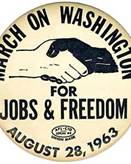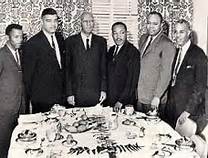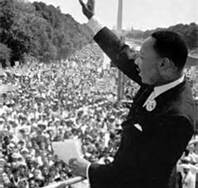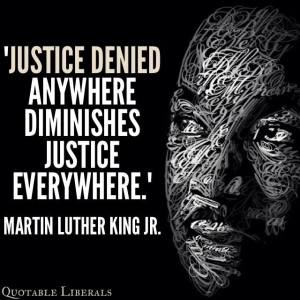 In just a few weeks August 28, 2013 will mark the 50th anniversary of the March on Washington for Jobs and Freedom. A mass protest that helped energize some of the most critical social legislation in the nation's history and inspired a generation of activists focused on ending poverty, racism and violence. I remember where I was on the day of the historic event as a small child and as time pasted I never thought 50 years later we would need to march for the same things - ending poverty, racism and violence.
In just a few weeks August 28, 2013 will mark the 50th anniversary of the March on Washington for Jobs and Freedom. A mass protest that helped energize some of the most critical social legislation in the nation's history and inspired a generation of activists focused on ending poverty, racism and violence. I remember where I was on the day of the historic event as a small child and as time pasted I never thought 50 years later we would need to march for the same things - ending poverty, racism and violence.
But over time I have learned that as sure as things change – they remain the same. Attended by more than 250,000 people that was said to be the largest demonstration Washington had ever seen at the time. The march reached a galvanizing high point with Dr. Martin Luther King's "I Have a Dream" speech, which stands today as one of the best known and most beloved speeches in modern history.
The backdrop for the march was the outrage sparked by media coverage of police brutality in Birmingham, Alabama where attack dogs and fire hoses were turned against peaceful protesters - many of whom were in their early teens or younger. Martin Luther King, Jr., was arrested and jailed during these protests, writing his famous "Letter From Birmingham City Jail," which advocates civil disobedience against unjust laws. Dozens of additional demonstrations took place across the country, from California to New York, culminating in the March.
 The March represented a coalition of several civil rights organizations, all of which generally had different approaches and different agendas. The "Big Six" as they came to be known organizers were James Farmer, of the Congress of Racial Equality (CORE); Martin Luther King, Jr., of the Southern Christian Leadership Conference (SCLC); John Lewis, of the Student Nonviolent Coordinating Committee (SNCC); A. Philip Randolph, of the Brotherhood of Sleeping Car Porters; Roy Wilkins, of the National Association for the Advancement of Colored People (NAACP); and Whitney Young, Jr., of the National Urban League. There was only one female speaker that day, Josephine Baker, who introduced several "Negro Women Fighters for Freedom," including Rosa Parks.
The March represented a coalition of several civil rights organizations, all of which generally had different approaches and different agendas. The "Big Six" as they came to be known organizers were James Farmer, of the Congress of Racial Equality (CORE); Martin Luther King, Jr., of the Southern Christian Leadership Conference (SCLC); John Lewis, of the Student Nonviolent Coordinating Committee (SNCC); A. Philip Randolph, of the Brotherhood of Sleeping Car Porters; Roy Wilkins, of the National Association for the Advancement of Colored People (NAACP); and Whitney Young, Jr., of the National Urban League. There was only one female speaker that day, Josephine Baker, who introduced several "Negro Women Fighters for Freedom," including Rosa Parks.
The stated demands of the march were the passage of meaningful civil rights legislation; the elimination of racial segregation in public schools; protection for demonstrators against police brutality; a major public-works program to provide jobs; the passage of a law prohibiting racial discrimination in public and private hiring; a $2 an hour minimum wage; and self-government for the District of Columbia, which had a black majority.
President Kennedy called the leaders of the big six to the White House because he want discouraged the march supposedly for fear that it might make the legislature vote against civil rights laws in reaction to a perceived threat. Kennedy demanded that language was changed and that the voices for justice were toned down to almost meek words. Once it became clear that the march would go on, he stationed troops “on the ready” around the city while publically he claimed to support the march.
The AFL-CIO remained neutral and outright opposition came from two sides. White supremacist groups, including the Ku Klux Klan, were obviously not in favor of any event supporting racial equality. On the other hand, the march was also condemned by some civil rights activists who felt it presented an inaccurate, sanitized pageant of racial harmony; Malcolm X called it the "Farce on Washington," and members of the Nation of Islam who attended the march faced a temporary suspension.
Lewis represented the Student Nonviolent Coordinating Committee, a younger, more radical group than King's. The speech he planned to give, circulated beforehand, was objected to by other participants; it called Kennedy's civil rights bill "too little, too late," asked "which side is the federal government on?" It declared that they would march "through the Heart of Dixie, the way Sherman did" and "burn Jim Crow to the ground—nonviolently." In the end, he agreed to tone down the more inflammatory portions of his speech, but even the revised version was the most controversial of the day, stating:
The revolution is at hand, and we must free ourselves of the chains of political and economic slavery. The nonviolent revolution is saying, "We will not wait for the courts to act, for we have been waiting hundreds of years. We will not wait for the President, nor the Justice Department, nor Congress, but we will take matters into our own hands, and create a great source of power, outside of any national structure that could and would assure us victory." For those who have said, "Be patient and wait!" we must say, "Patience is a dirty and nasty word." We cannot be patient, we do not want to be free gradually, we want our freedom, and we want it now. We cannot depend on any political party, for the Democrats and the Republicans have betrayed the basic principles of the Declaration of Independence.
 King's speech remains one of the most famous speeches in American history. He started with prepared remarks, saying he was there to "cash a check" for "Life, Liberty and the pursuit of Happiness," while warning fellow protesters not to "allow our creative protest to degenerate into physical violence.
King's speech remains one of the most famous speeches in American history. He started with prepared remarks, saying he was there to "cash a check" for "Life, Liberty and the pursuit of Happiness," while warning fellow protesters not to "allow our creative protest to degenerate into physical violence.
Again and again, we must rise to the majestic heights of meeting physical force with soul force." But then he departed from his script, shifting into the "I have a dream" theme he'd used on prior occasions, drawing on both "the American dream" and religious themes, speaking of an America where his children "will not be judged by the color of their skin but by the content of their character." He followed this with an exhortation to "let freedom ring" across the nation, and concluded with:
And when this happens, when we allow freedom to ring, when we let it ring from every village and every hamlet, from every state and every city, we will be able to speed up that day when all of God's children, black men and white men, Jews and Gentiles, Protestants and Catholics, will be able to join hands and sing in the words of the old Negro spiritual, "Free at last, free at last. Thank God Almighty, we are free at last."
 It appears Brother Martin was wrong! The KKK now wear black robes, justice is still denied, we see James Crow Esq. the son of segregation, a new Citizens Council called the Tea Party, poverty, and joblessness is worst than it was in his day. Now, for a man of peace who fought, struggled, and died for equality; he has been reduced to a four word phrase – “I have a Dream”.
It appears Brother Martin was wrong! The KKK now wear black robes, justice is still denied, we see James Crow Esq. the son of segregation, a new Citizens Council called the Tea Party, poverty, and joblessness is worst than it was in his day. Now, for a man of peace who fought, struggled, and died for equality; he has been reduced to a four word phrase – “I have a Dream”.
Maybe they were right when they said what he preached was just a dream! And that’s my thought provoking perspective…








No comments:
Post a Comment